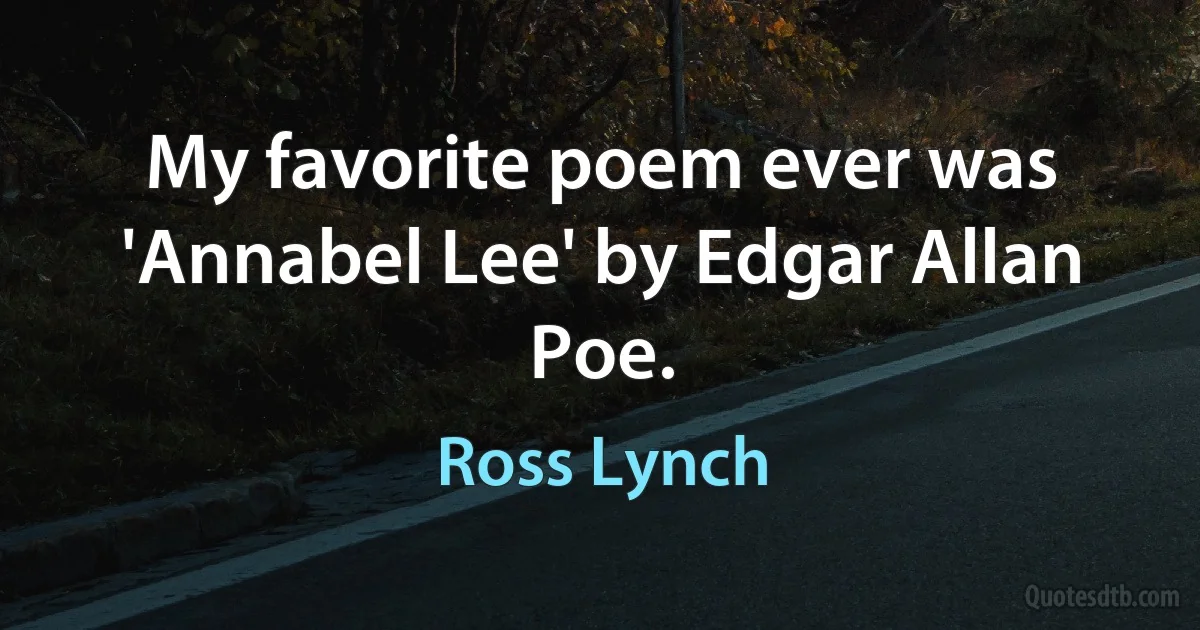Edgar Quotes - page 2
The first class contains four, which, we are informed, may be properly called beasts for hunting; namely, the hare, the hart, the wolf, and the wild boar. The second class contains the names of the beasts of the chase, and they are five; that is to say, the buck, the doe, the fox, the martin, and the roe. In the third class we find three, that are said to afford "greate dysporte" in the pursuit, and they are denominated, the grey or badger, the wild-cat and the otter...The reader may possibly be surprised, when he casts his eye over the foregoing list of animals for hunting, at seeing the names of several that do not exist at this time in England, and especially of the wolf, because he will readily recollect the story so commonly told of their destruction during the reign of Edgar.

Joseph Strutt
I remember when I was very young, I had a fever - a long rheumatic fever in bed for four months. And in the days, I stayed alone with the maid. I only had my father's books with me. They were fantasy books about ghosts, and also books by Edgar Allen Poe that made a forever impression on me.

Dario Argento
You know, back in the 1950s and '60s, when J. Edgar Hoover was making the FBI the respected organization it used to be, oftentimes they would find a fugitive and basically have his house surrounded, and then put out a press release saying he was on the top 10 most wanted list. And 10 minutes later, he'd be arrested.

Howie Carr
By every measure, John Kennedy's sex life was compulsive and reckless. At one level, it had clear public consequences. Knowledge of Kennedy's behavior gave FBI Director J. Edgar Hoover absolute job security, as well as the potential power to derail Kennedy's re-election had he survived assassination.

Jeff Greenfield
Epilepsy is a disease in the shadows. Patients are often reluctant to admit their condition - even to close family, friends or co-workers - because there's still a great deal of stigma and mystery surrounding the disease that plagued such historical figures as Julius Caesar, Edgar Allan Poe and Lewis Carroll.

Lynda Resnick
I've always listened to music while I write, but none of my work has been so directly impacted by a song as my new novel, 'So Cold the River,' for which the brilliant strings piece 'Short Trip Home,' composed by Edgar Meyer and featuring the incredible Joshua Bell on violin, inspired much of the story.

Michael Koryta
Instead of copying Nature, we [ Cubists ] create a 'milieu', of our own, wherein our sentiment can work itself out through a juxtaposition of colors. It is hard to explain it, but it may perhaps be illustrated by analogy of literature and music. Your [ Gelett Burgess is American] Edgar Poe did not attempt to reproduce Nature realistically. Some phase of life suggested an emotion, as that of horror in 'The Fall of the House of Ushur.

Jean Metzinger
We are in the process of seeing the fulfillment of Edgar Allan Poe's prophecy in which the painter, impassioned by his mistress-model and also by his art, "did not want to see that the colors he spread on his canvas were taken from the cheeks of the woman seated beside him. And when several weeks had passed, and very little remained to be done, nothing but a stroke on the mouth and a glaze over the eye, the mistress's spirit still flickered like the flame at the base of a lamp. Then he put on the final touch, put the glaze in place, and for a moment the painter stood in ecstasy before the work he had finished. But a moment later, he was struck with panic, and shouting with a piercing voice: ‘It is truly Life itself,' he suddenly turned around to look at his mistress. She was dead."

Jacques Ellul
Yes, there was Edgar, whom I starved and hunted until I was tired of it: then I chased him up a back alley one night, and knocked out those annoying brains of his. And there was Walt, whom I chivvied and battered from place to place, and made a paralytic of him: and him, too, I labelled offensive and lewd and lascivious and indecent. Then later there was Mark, whom I frightened into disguising himself in a clown's suit, so that nobody might suspect him to be a maker of literature: indeed, I frightened him so that he hid away the greater part of what he had made until after he was dead, and I could not get at him. That was a disgusting trick to play on me, I consider.

James Branch Cabell
Yet I was a fool to fancy for a moment that she valued Edgar Linton's attachment more than mine -- If he love with all the powers of his puny being, he couldn't love as much in eighty years, as I could in a day. And Catherine has a heart as deep as I have; the sea could be as readily contained in that horse-trough, as her whole affection be monopolized by him -- Tush! He is scarcely a degree dearer to her than her dog, or her horse -- It is not in him to be loved like me, how can she love in him what he has not?

Emily Brontë
A post-war anti-Communist paranoia was constructed by J. Edgar Hoover, a friend and manipulator of every president since the 1920's. It flared in the machinations of the House Un-American Activities Committee (HUAC), formerly the Dies Committee. It spread like the proverbial prairie fire, fanned by the shameful Senate hearings conducted by Hoover's close friend Joseph McCarthy.

Elaine Brown
At about the age of eleven, I was reading the thrillers of Sax Rohmer and Edgar Wallace concerning Dr. Fu Manchu and other sophisticated Chinese villains, nurturing a secret admiration for these gentlemen because of their opposition to the suet-pudding heroism of our own culture, and because of their refined and mysterious style of life. While other boys dreamed of becoming generals, cowboys, mountain climbers, explorers, and engineers, I wanted to be a Chinese villain. I wanted servants carrying knives in their sleeves, appearing or vanishing without the slightest sound. I wanted a house with secret doors and passages, with Coromandel screens, with ancient scrolls, with ivory and lacquer boxes of exotic poisons, with exquisite brands of tea, with delicate blue porcelain, with jade idols and joss-sticks, and with sonorous gongs.

Alan Watts



